Course
Salary expectations are always a key factor when looking for new job opportunities, and if you are considering breaking into data science, here is the great news: data scientists, as well as other data-related jobs, command some of the highest salaries in the tech industry.
According to 2023 data from the US Bureau of Labor Statistics, data science is the third fastest-growing occupation, with an estimated growth rate of 35% between 2021 and 2031. Across nearly every industry, organizations compete for data science professionals to leverage their data and drive smart business decisions. However, since the supply of data professionals has not yet caught up with the demand, the competition between companies in hiring these professionals is fierce compared to other tech sectors. As a result, employers are willing to pay top salaries to talented data scientists.
Notwithstanding the profitable honeymoon this field is experiencing, it is important to note that data science salaries can range considerably across professionals. Employers consider several factors when deciding how much to pay, including experience, skills, job title, or company size.
In this article, we will provide an overview of the data science salaries in 2024. We will study the different criteria that influence salary based on data from several job portals, such as Glassdoor and PayScale, public data from the U.S. Bureau of Labor Statistics, and job surveys, such as the O’Reilly Data Science Salary surveys.
To narrow our subject matter, we will only focus on the salary landscape in the U.S.
Data Science Salaries by Experience
How much does a data scientist earn on average? According to Indeed, the average base pay for data scientists in the U.S. is $123,069 annually, based on 4,200 salaries reported.

Image source: Indeed
The salary is a bit lower when looking at the data from PayScale, which gives an average estimate of $100,598 a year based on around 9,000 salary profiles.

Image source: Payscale
However, the average salary of a data scientist changes with the level of experience. As reported by PayScale, if you are an aspiring data scientist looking for your first job in the field, you can expect on average a salary of $87,000. Data scientists with 1-4 years of experience, on the other hand, can expect a total compensation of $98,000, while 5-9 years of experience means an average salary of around $113,000.
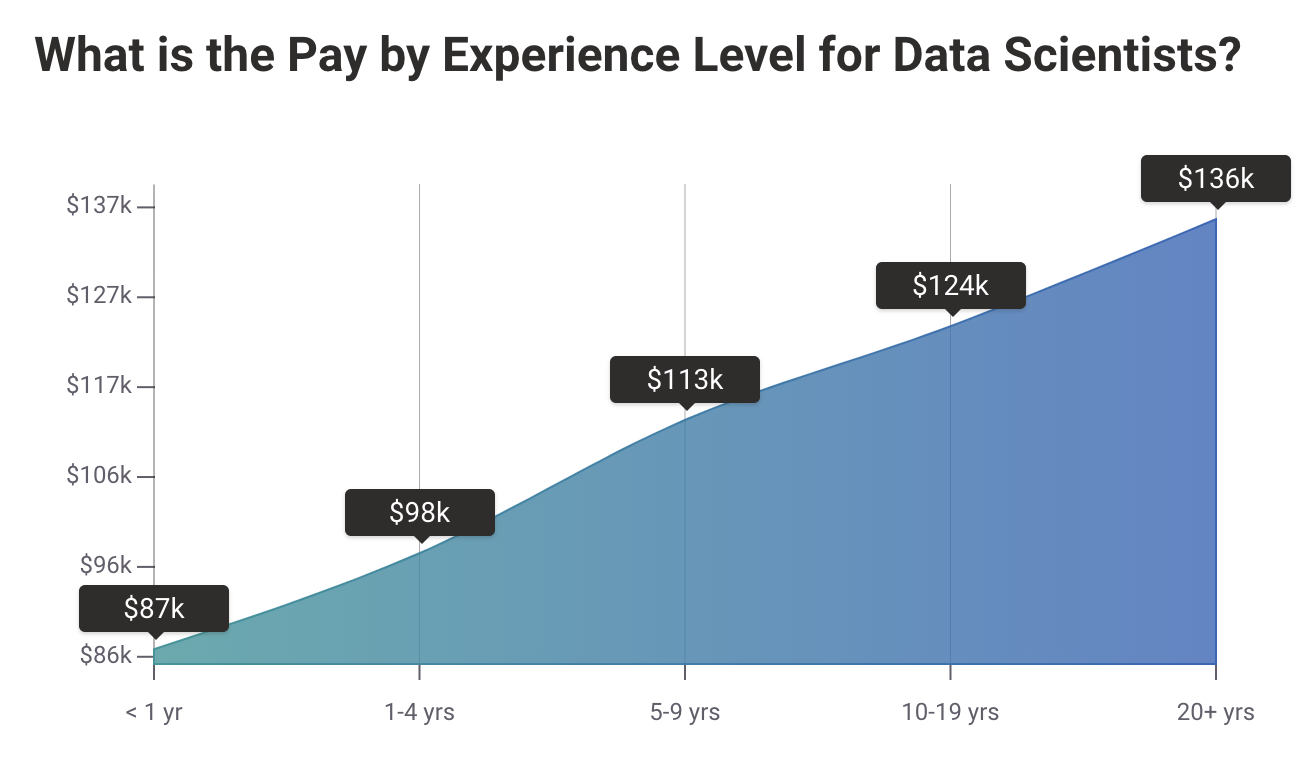
Image source: PayScale
These averages have increased by around $2,000 annually since we last collated this data in 2022. These estimates are in line with the findings of the O’Reilly 2021 Data/AI Salary Survey, which estimates that the average change in compensation over the last three years in the data science/AI field is $9,252, which corresponded to an annual increase of 2.25%.
Data Science Salaries by Job Title
Data professionals is a rubric that encompasses several roles, including data scientists, data engineers, data analysts, and machine learning engineers. The responsibilities, qualifications, and, ultimately, salaries vary widely across these professionals. In general, the more a data science professional deals with managerial responsibilities (e.g., leading team projects and communicating directly with clients), the higher the compensation.
Below you can find a list of salary ranges and averages of data science professionals, according to Indeed.com:
Data Scientist
A data scientist researches, extracts, and reports meaningful insights present in data. To do so, data scientists use computers and programming languages to process all the information, make complex calculations, create useful data visualizations, and obtain results. Do you want to become a data scientist? Datacamp has great career tracks to become one, either with Python or R.
- Salary average: $123,069. Salary range: $78k - $194k.
Read more about data scientist salaries around the world in a separate article.
Machine Learning Engineer
Machine learning engineers are highly skilled programmers who develop models that use large data sets to research, develop, and generate algorithms that can learn and make predictions.
- Salary average: $161,407. Salary range: $105k - $247k
This is one of the most complex and profitable careers in data science. To get started, we highly recommend enrolling in our Machine Learning Scientist with Python career track.
Data Engineer
Data engineers are responsible for laying the foundations for the acquisition, storage, transformation, and management of data in an organization. It is one of the most in-demand careers in data science.
- Salary average: $126,610. Salary range: $81k - $196k.
Check out our full guide on data engineer salaries around the world to learn more.
Cloud Engineer
A cloud engineer is a data professional who deals with cloud-related work. Typically, this includes the management, planning, architecture, and monitoring of cloud systems. More and more companies are turning to cloud services.
- Salary average: $127,119. Salary range: $83k - $192k.
If you want to get started in this highly sought-after discipline, our course Understanding Cloud Computing is a great place to begin.
Data Analyst
They are responsible for processing the data that the company already has. One of their regular tasks is using databases to make reports and dashboards.
- Salary average: $78,324. Salary range: $49k - $123k.
If you are interested in becoming a data analyst, check out our Data Analyst with Python Career Track.
Data Science Manager
This role is a managerial role that involves decision-making. Data science managers are in charge of the project operations, acting as an intermediary between the team of analysts, scientists, data architects, and the client. They must understand the technology even though they are not in charge of its development.
- Salary average: $126,506. Salary range: $69k - $231k.
Data Science Salaries by Company Size
Another relevant factor influencing data science salaries is a company's size: in general, the larger the organization, the higher the salary. The O’Reilly 2016 Salary Data Science Salary Report sheds light on this factor. A few years have passed since the survey, but we believe this will apply similarly in 2024.
According to their publication, data scientists working in companies with more than 1,000 employees would receive a median salary ranging from $90,000 to $110,000, whereas the median salary of data professionals working in medium-sized companies (26 to 1,000 members) is around $80,000. Employees working in small companies and startups (2-25 members) tend to have a lower median salary of around $60,000.
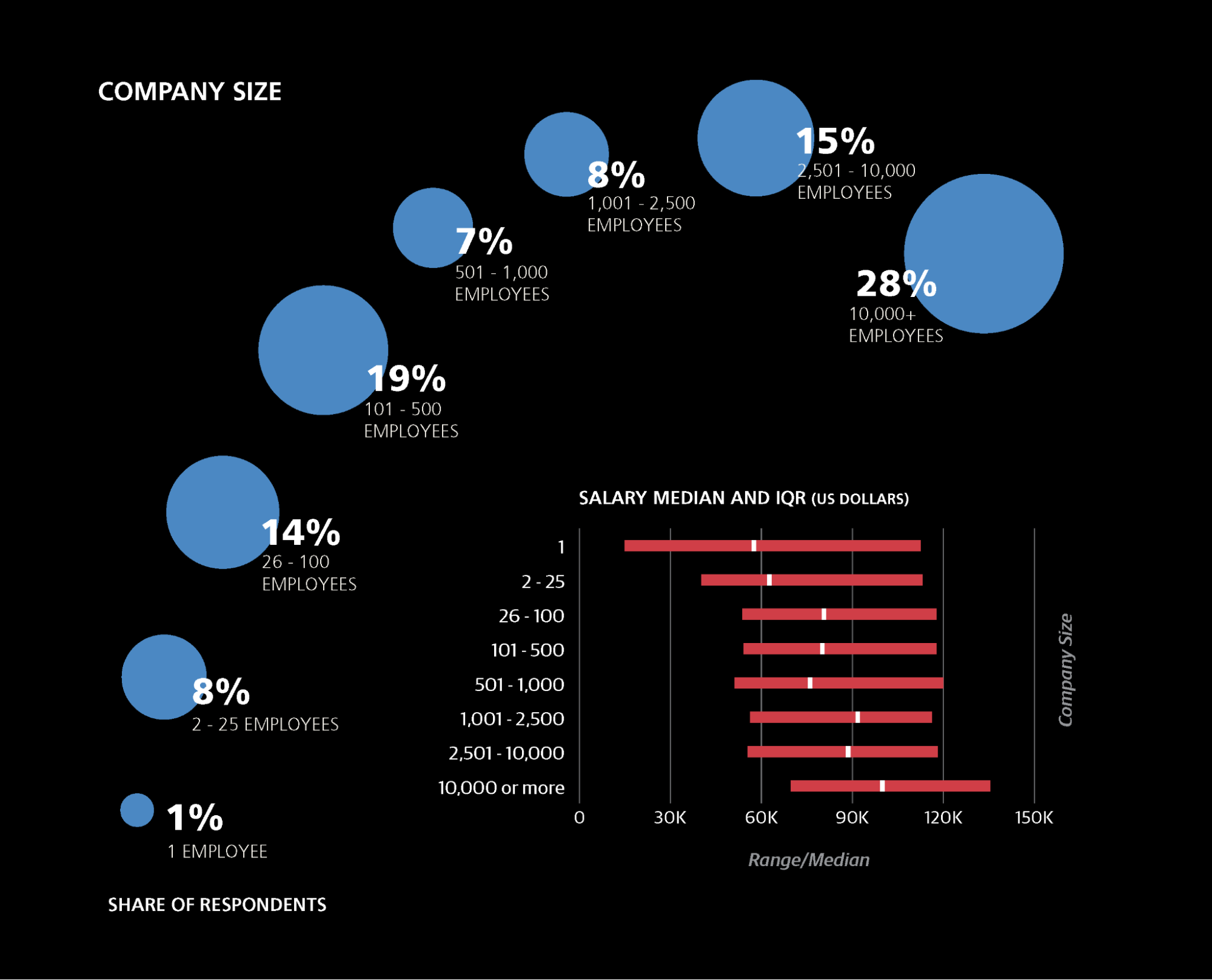
Image source: O’Reilly
Data Science Salaries for Freelancers
With the advantages of working from home growing, more and more people are wondering if now is the right time to try out freelancing. Data professionals are not exempt. In recent months, the number of data science jobs available on popular freelancer platforms, such as Upwork, has skyrocketed.
If you are considering this option, you may be wondering how much freelance data scientists make. According to Glassdoor, their average salary in the US is $116k, with salaries ranging from $90k to $149k.
However, the earnings of freelance data scientists are highly dependent on factors such as their skills, experience, and reviews. As a result, the salary range between junior and senior data scientists is very wide. For example, this 2023 research based on data from Upwork shows that a novice freelance data scientist can charge $50/hour, whereas an experienced data scientist can charge up to $150-200/hour.
Data Science Salaries across Industries
Data scientists are required in nearly every industry, but some have greater needs and are willing to offer more attractive salaries. Again, the O’Reilly 2021 Data/AI Salary Survey is a helpful resource for comparing salaries across industries.
Overall, data professionals working in the computer industry,e.g., computer hardware, cloud services, cybersecurity, or software development, reported the highest salaries, with average compensations ranging from $171,000 (for computer hardware) to $164,000 (for software). Nonetheless, the data also shows highly competitive salaries (over $100,000) across industries outside computing, including banking, retail, fashion, and insurance.
This picture is consistent with the latest occupation data released by the U.S. Bureau of Labor Statistics in 2023.
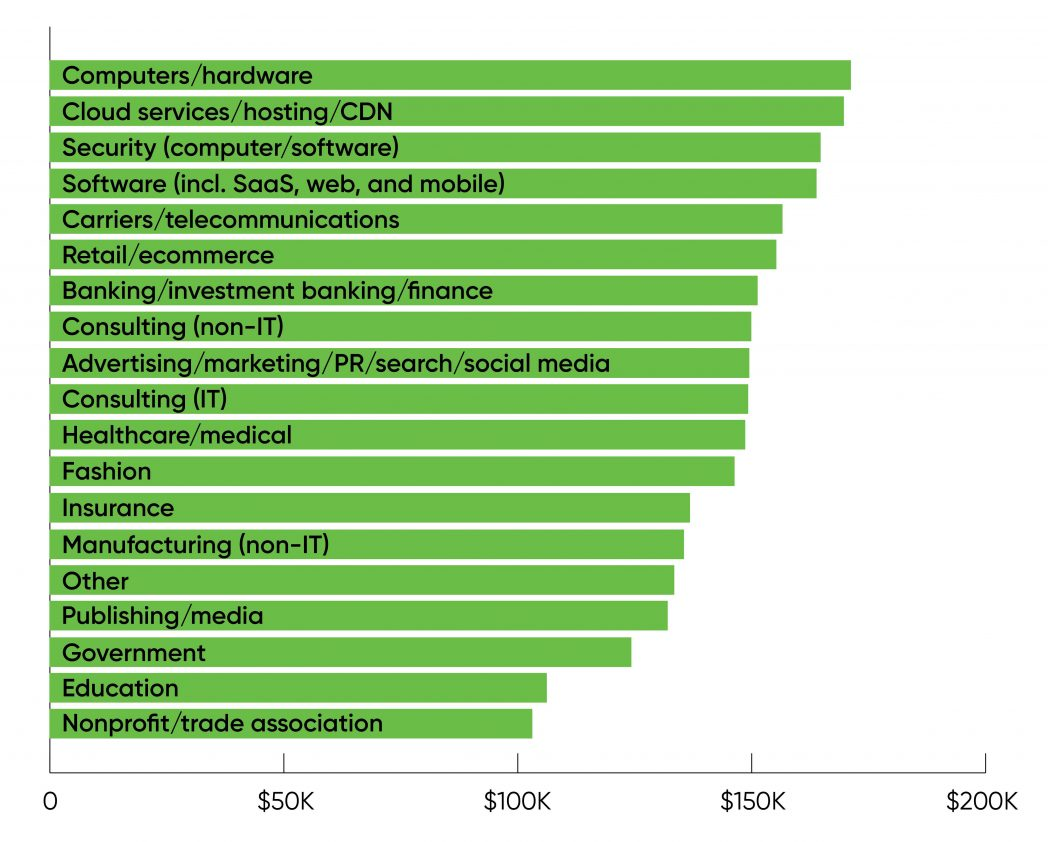
Image source: O’Reilly
Data Science Salaries by Skills
Data science is a rapidly evolving field. New technologies and software are constantly emerging. This makes training not only a way to catch up with innovation but also a factor closely correlated to higher salaries, the ability to be hired, and job security.
Overall, some rare, sought-after competencies significantly increase data scientists' salary demands.
Computer programming, mastery of big data tools, cloud computing, and data visualization are among the most valued skills. Likewise, personal qualities such as scientific curiosity, business savviness, communication skills, and leadership can greatly increase compensation.
Below you can find a list of skills that affect data scientists' salaries in 2024 according to PayScale:

Image source: PayScale
According to the O’Reilly 2021 Data/AI Salary Survey, cloud training, particularly in Amazon Web Services (AWS) and Microsoft Azure, was the skill most strongly associated with higher salary increases.
Other important skills that respondents mentioned were machine learning, container technology (e.g., Docker and Kubernetes), MLOps, and data science pipeline tools, such as Kafka.
Regarding programming languages, the survey shows that the less common languages in data science, e.g., Rust, Go, or Scale, are also closely associated with high salaries.
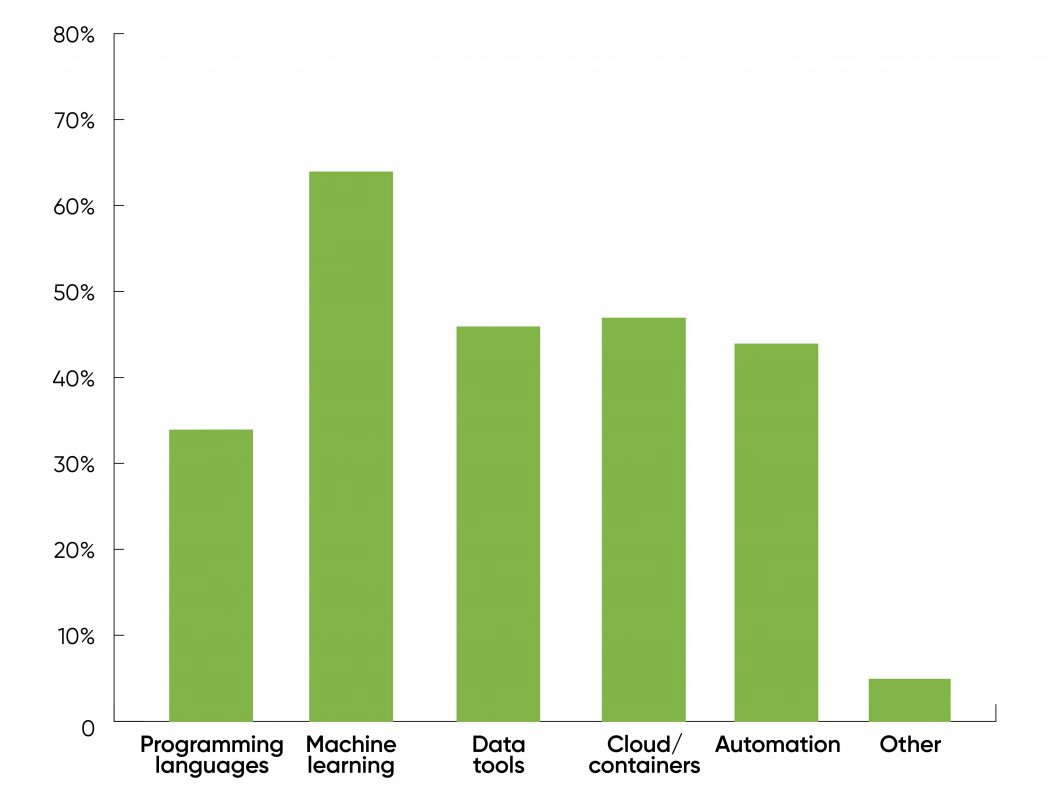
Question: What technologies will have the biggest effect on compensation in the coming year? Image source: O’Reilly
Data Science Salaries by Location
Data science salaries are also strongly dependent on location. Average compensation differs significantly within the United States, as shown by the data from the U.S. Bureau of Labor Statistics.
Overall, mean salaries tend to be higher in states along both the East and West Coasts, with the highest mean salaries in California ($140,490), Texas ($109,000), New York( $134,830), Florida ($106,490), Pennsylvania ($102,370).
This comes as no surprise: the cited states align with some of the biggest tech hotspots in the country, including San José —also known as the capital of Silicon Valley—, San Francisco, and New York, where data science professionals normally earn good six-figure salaries.
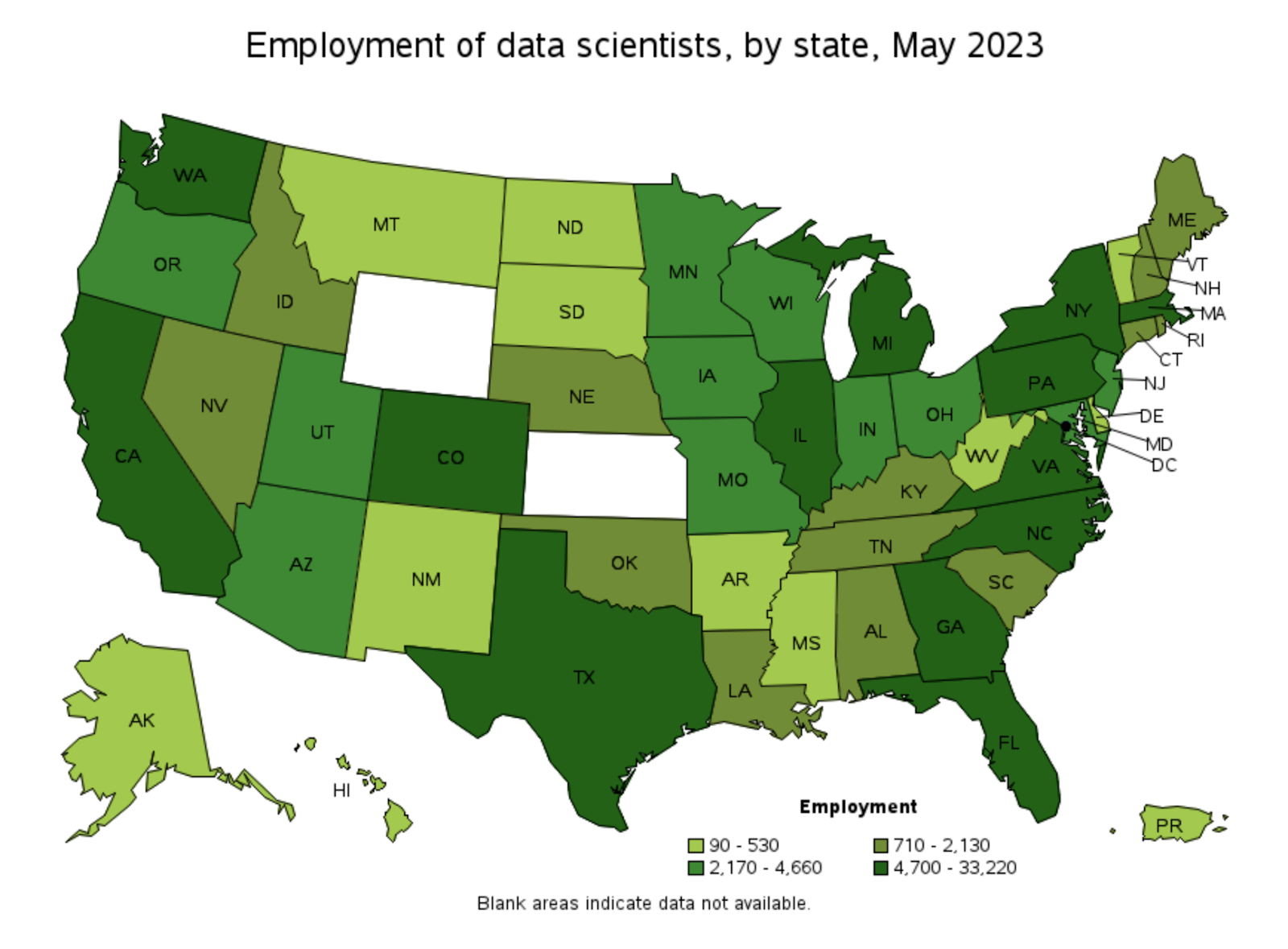
Image source: U.S. Bureau of Labor Statistics
What You Can Do to Increase Your Salary
Data science is a vibrant and highly disruptive field in itself. The ecosystem is changing at a fast pace, with new technologies, tools, and software constantly being introduced, which makes it very difficult to predict what things will look like in 10 years.
Given this environment, continuous training is key for data professionals not only to keep up with the speed of innovation but also to achieve salary increases or promotions. Indeed, learning new skills and improving old ones is regarded as one of the best routes to promotion. In addition, investing in training programs is the preferable and most feasible strategy for employers to grow their data science and machine learning teams internally, given the shortage of qualified data science professionals.
What are the best pathways for upskilling? Depending on your time availability and how much your company is willing to invest in your education, you could consider the following options:
- Formal degrees in data science. Going for an advanced education program, such as a Ph.D. or a master’s degree in data science or a related field is a great way to level up in your organization. Most big tech companies are encouraging their employees to pursue these kinds of programs.
- Data science platforms. If you want to become a subject expert, sharpen your coding skills, or learn new technologies, you are probably looking for a course. There are many options out there, including DataCamp. Don’t miss the opportunity to explore our large catalog of courses, or sign up for one of our skill tracks to expand your areas of expertise.
- Data science certifications. Getting certified is becoming one of the more common and fastest ways to pick up or improve new data science skills. The list of certifications is rapidly growing, ranging from general data science certifications to vendor-specific and technology-specific ones. According to the O’Reilly 2021 Data/AI Salary Survey, cloud certifications, specifically in AWS and Microsoft Azure, were most strongly associated with salary increases.
Future Trends
Data science is living in a golden age, thanks to the artificial intelligence boom in the past couple of years. Companies across sectors and industries are in desperate need of data professionals who leverage the power of data to drive smart decisions.
According to LinkedIn’s 2024 Report for Jobs on the Rise, the AI engineer and AI consultant roles make the top 10 list. These new roles require a strong data science background and most people fulfilling them came from a data scientist position.
The supply of data professionals has not yet caught up with the demand. The shortage of qualified data scientists translates into steep competition between companies, which are offering very competitive salaries to get hard-to-hire talent.
What can we expect in the coming future? As data science advances into machine learning and artificial intelligence, we can certainly expect the demand for data professionals to continue growing. Professionals with traditional data science backgrounds will look to upskill and move into the exciting world of AI, landing the most lucrative roles in data. For people just entering the field, the panorama is also exciting, with a plethora of learning resources at their fingertips.
Conclusion
We hope you enjoyed this article. Data science is booming, and the opportunities are plenty and highly profitable for those interested in breaking into the field.
If you are considering starting a new adventure in the exciting world of data, Datacamp is the best place to get started. Check out our data science course catalog and begin your learning journey today.
Interested in other roles? Check out our other articles:
FAQs
What are some emerging trends in data science that could impact future salaries?
Emerging trends in data science include the increased use of artificial intelligence (AI) and machine learning (ML), the rise of data engineering roles, and the integration of data science with cloud computing. These trends are likely to push salaries higher as demand for specialized skills increases.
How does remote work affect data science salaries?
Remote work can impact data science salaries by broadening the talent pool for employers and providing employees with more job opportunities. This could lead to salary adjustments based on cost-of-living differences, but generally, the demand for skilled data scientists keeps salaries competitive.
How do certifications impact data science salaries?
Certifications can significantly impact data science salaries by validating a professional's expertise and increasing their marketability. Certifications in specialized areas like cloud computing, machine learning, or specific tools (e.g., AWS, Azure) are particularly valued and often associated with higher salaries.
Are there specific industries where data science skills are more in demand?
Yes, data science skills are highly in demand in industries such as finance, healthcare, retail, technology, and telecommunications. These industries rely heavily on data-driven decision-making and are willing to offer competitive salaries to attract top talent.
How do bonuses and stock options affect the overall compensation of data scientists?
Bonuses and stock options can significantly enhance the overall compensation package for data scientists. Many tech companies offer performance-based bonuses and equity to attract and retain top talent, which can add substantial value beyond base salaries.
What is the typical career progression for a data scientist?
Typical career progression for a data scientist starts with entry-level roles such as junior data scientist or data analyst. With experience, they can advance to mid-level positions like senior data scientist or machine learning engineer, and eventually to leadership roles such as data science manager or chief data officer.
How can data scientists negotiate higher salaries?
Data scientists can negotiate higher salaries by highlighting their specialized skills, certifications, and experience. Demonstrating the impact of their work on business outcomes, staying updated with industry trends, and being aware of market salary benchmarks can also strengthen their negotiating position.
How important is a portfolio for a data science career?
A portfolio is very important for a data science career as it showcases a candidate’s practical skills and project experience. A well-curated portfolio with diverse projects can demonstrate expertise and problem-solving abilities, making it easier to land job opportunities and negotiate better salaries.
What resources are available for continuous learning in data science?
Resources for continuous learning in data science include online courses (e.g., DataCamp), certification programs (e.g., AWS, Microsoft Azure), academic programs (e.g., master's degrees), professional communities (e.g., Kaggle, GitHub), and industry conferences and webinars.